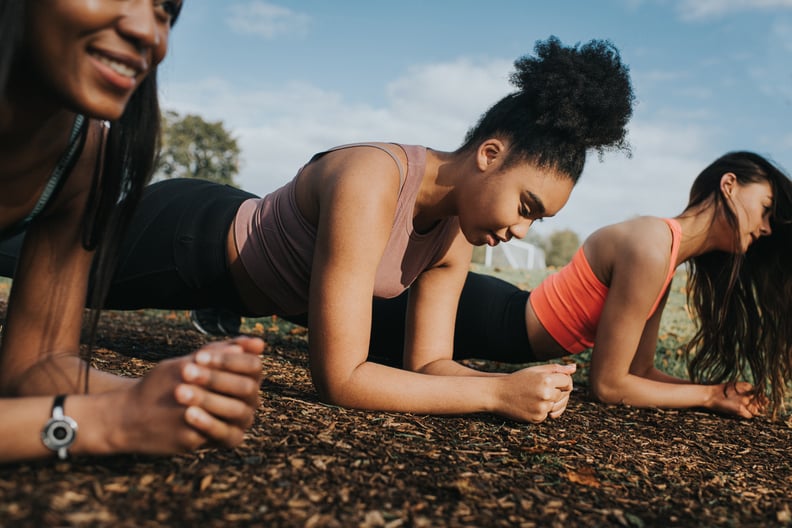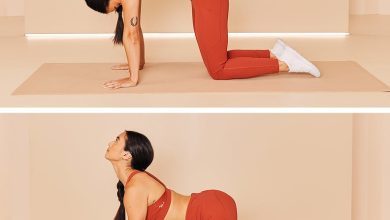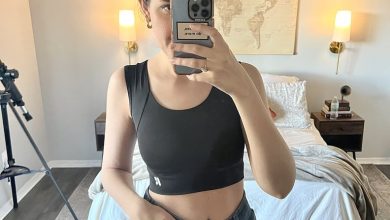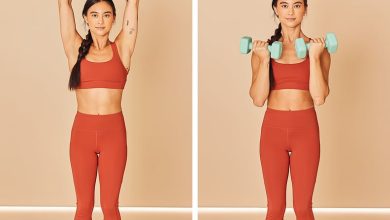How to Motivate Yourself to Work Out, With Tips From a Trainer

The start of a new year is inherently motivational. It’s a chance to start over, set new intentions, or re-visit any old goals — especially when it comes to health and wellness. In terms of resolutions, fitness is among the most popular categories, with many of us swearing to be more consistent, challenge ourselves, or just get to the gym in the first place. But when the confetti has cleared and that New Year’s spark isn’t burning quite as bright, how do you motivate yourself to work out (and stay consistent in the midst of a winter slump)?
Finding the motivation to work out can be just as hard as actually working out (if not harder). That’s why learning how to stay motivated is an essential part of reaching your fitness goals. Fortunately, there are plenty of strategies to help you get moving and stay motivated to work out. Ahead, we asked a trainer to share her best tips for finding workout motivation — whether you’re a beginner, dedicated gym-goer, or someone looking to start working out again.
Experts Featured in This Article
Kelly Froelich is an NASM- and ACE-certified trainer and director of business intelligence at fitness and wellness software company Mindbody.
How to Motivate Yourself to Work Out
Remember that no fitness journey is linear, and even the most dedicated fitness enthusiasts experience dips in motivation at one point or another. If you’re not feeling motivated to work out, consider what might be causing those feelings in the first place. A lack of motivation could also be a sign of burnout, stress and anxiety, or flat-out exhaustion. Addressing the root cause (even if you need to ask a professional for support) may make it easier to feel more motivated in the long run. That said, if you’re just looking for a little extra motivation, we’re here to help. Here are some recs from trainer Kelly Froelich to keep in your arsenal the next time you need an extra boost of inspiration:
- Just get dressed: Breaking big tasks into smaller steps can be a huge help for people trying to get things done (especially if you’re dealing with anxiety or depression). If you’re struggling to find the motivation to hit the gym, start by just putting your gym clothes on. This can help you build the momentum you need to get out the door. Bonus points if you manage to find a cute workout set.
- Stick with workouts you enjoy: If the thought of climbing the stairmaster fills you with a sense of existential dread, pick something else. Maybe you’d prefer the energy of a group fitness class, the low-impact nature of Pilates, or the meditative effects of a hot girl walk. At the end of the day, the best workout is the one you enjoy doing, and finding joy in your workouts can help you stay motivated to exercise on a more regular basis.
- Find a workout buddy: “For extroverts or people who like being around people, I think accountability buddies, or simply workout buddies, are great,” Froelich tells PS. “Sometimes, it’s easier to let yourself down by skipping a workout than letting a friend down by missing it.” Research published in the journal Annals of Behavioral Medicine also shows that working out with a partner or group encourages people to work out harder. That doesn’t mean you need to do every workout with a friend, but having a standing weekly workout date can help you stay motivated and look forward to working out.
- Try habit stacking: A term was coined by SJ Scott, “habit stacking” is when you attach a new behavior (like working out) to an existing part of your routine. For instance, “I like to start my day with a coffee, a workout, and a meditation,” Froelich explains. “That coffee, which I love, puts into motion the rest of my day, as I know after the coffee, I work out, and then meditate.”
- Listen while you walk: Listening to podcasts while you walk is a great way to get you moving . . . even if all you want to do is sit on the couch. Speaking from personal experience, a good podcast can make even hour-long walks fly by (plus, you’ll probably learn something in the process). If you’re more of a music person though, you can also motivate yourself by creating a workout playlist you’re genuinely excited to listen to.
- Sign up for a workout class: If a workout class is within your budget, paying for an instructor to lead you through a workout might be a good way to motivate yourself to exercise. Chances are, you won’t want to waste your money by canceling, and you’ll feel more energized by all the people around you.
- Join a challenge: Challenges are another powerful source of motivation. “A 30-day challenge with a significant prize at the end — a massage or a dinner out with friends — is a great way to stay motivated.” Froelich says. “Intrinsic motivation, such as an internal desire to do something, is great to stick to something in the long run, but sometimes you need a bit of extrinsic motivation, such as a prize, to start you off.” The exact challenge can totally depend on your goals and interests. It might involving following a specific workout plan, completing a certain race, or working out three times a week for a month straight. For inspiration, many workout apps have built-in challenges you can easily sign up for (for free).
- Take your workout outdoors: Exercise is beneficial no matter where you do it. But research shows that spending time in nature is especially good for overall health and wellness. If you’re struggling to find the motivation to work out, try taking your workout outdoors. Whether you walk, run, bike, or hike, being out in nature might help you feel more motivated to get it done.
- Remember why you started: “When I train for a marathon, there are many, many times when I simply do not want to go on a long run” Froelich says. “But, I always come back to the reason I was going on a run.” Even a simple “why” is valuable (for example, working out feels good or leaves you with a clearer head). Reminding yourself of that post-workout feeling could be what helps you find some workout motivation.
- Set realistic goals: Froelich encourages her clients to set realistic goals, such as working out three times a week for 30 minutes. “The key is that the goal isn’t ‘work out Monday, Wednesday, Friday’ and, if you miss a day, you miss the goal,” she says. “The goal should be flexible to how you are feeling and what times work for your schedule.” When your workout goal feels attainable instead of intimidating, it might be a little easier to get to your workout.
- Resist the urge to compare: Froelich says she’s most likely to stick to her workout routine when she turns off social media. “There are amazing communities and positive inspiration on Instagram, but there is also a lot of comparison,” she says. This can very quickly zap your motivation. “Instead of comparative ‘body inspiration,’ use your own body as inspiration,” Froelich says. “It can already do so many incredible things, and working out is a way to push your body (in a safe way) to do even more.”
- Be kind to yourself: Tearing yourself down won’t make you want to get up and do better tomorrow. “Be gentle with yourself. You are setting new goals for challenging things,” Froelich says. “Progress is not a straight line, but it does tilt upwards. If you have a bad workout or miss a workout day, say motivating things like you are talking to your best friend. Sometimes, we can be our own worst critic.”
— Additional reporting by Lauren Mazzo and Chandler Plante
Elizabeth “Liz” Enochs is a queer writer from southeast Missouri. She’s the author of the nonfiction prose chapbook “Leaving the House Unlocked.”
Lauren Mazzo was the senior fitness editor at PS. She is a certified personal trainer and fitness nutrition specialist through the American Council on Exercise. Prior to joining PS, she worked for six years as a writer and editor for Shape Magazine covering health, fitness, nutrition, mental health, sex and relationships, beauty, and astrology. She graduated from Ithaca College with a degree in Journalism and minors in Writing and Honors, with additional studies in gender, sex, and love.
Chandler Plante (she/her) is an assistant health and fitness editor for PS. She has over four years of professional journalism experience, previously working as an editorial assistant for People magazine and contributing to Ladygunn, Millie, and Bustle Digital Group.



